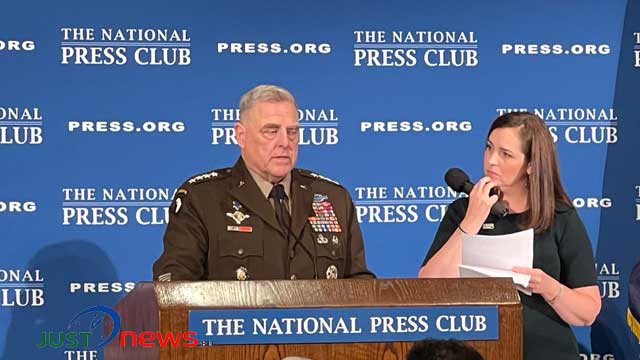M Mushfiqul Fazal
About criticism of the current US approach to China and Taiwan, Milley said, “It’s not … a zero-sum game. It’s not like that,” Milley said, adding, “There are other allies and partners out there [to help Taiwan]. It’s not just the United States.”
Mark Milley said these while speaking at the Headquarters luncheon at National Press Club in Washington on Friday.
Chinese leaders have stated they want “to be the regional hegemonic in Asia within the next 10 years, and they want to exceed global U.S. military power by midcentury,” Milley said. “The geostrategic history of this century will likely be determined by the United States-China relationship and whether it remains in a competition or tips into great power war.”
There is still time to dissuade Beijing not to use force to reunify Taiwan with mainland China, he said.
Milley said that despite well-publicized plans calling for the Chinese military to be ready to invade Taiwan by 2027, there is no indication Chinese President Xi Jinping has made a decision one way or the other.
He said that gives the U.S. and other countries time to show Xi the use of force would be a bad idea.
“You want to make sure that every single day, President Xi wakes up and says, 'Today is not that day,' and that that decision never comes,” Milley said.
The international rules-based order and the strategy of deterrence are not esoteric principles, but ideas that undergird peace in our world and are worth defending, he said.
The rules-based international order was what that paratrooper’s generation put in place to ensure a great powers war would not happen again. Milley noted that between 1914 and 1945 - World War I and World War II - approximately 150 million people were killed.
“It was the most violent three decades ever recorded in human history, all in the conduct of great power war,” the general said. “Two world wars and 30 years, two continents destroyed, millions killed, more refugees than at any point in history, systemic genocide of an entire ethnic and religious community. And, of course, the dropping of two nuclear weapons. It was a global slaughterhouse by any measure. And the world collectively said in 1945, never again.”
The peace established by this framework has lasted almost 80 years. It has proven its worth, but the rules-based international order is under great stress today, Milley said.
“In particular, Russia’s unprovoked and illegal invasion of Ukraine is a direct frontal assault on that rules-based international order,” he said. “We are now well over a year into this invasion. The bravery and resilience of the Ukrainian people are truly an inspiration to us all.”
Nations around the world have rallied to Ukraine's side and have been supplying the capabilities needed to defend the country. “We have said our political leaders have said multiple times that our task is to ensure that Ukraine has the support it needs to remain free and independent,” Milley said. “And we’re doing that in order to make sure that rules-based international order holds.”
Across the world, China is looking to rewrite those rules even though China has perhaps been the greatest beneficiary of those rules. “China’s economy has been growing rapidly for the last four decades, as we all know, and is now leveraging its financial power to build up an incredibly powerful military,” the general said. “They are well into doing that.”
Milley was asked Friday whether he might one day run for political office. “Absolutely not,” he said.
“I can make contributions to my country after I retire in many, many different ways. Public office is not one of them.”
Milley joined the Army in 1980 and he’s held numerous commands during his military career, including Army chief of staff, U.S. Army Forces Command, III Corps, International Security Assistance Force and the 10th Mountain Division. He was confirmed almost unanimously by the Senate as chairman of the Joint Chiefs of Staff in July 2019 and he is expected to be succeeded by Air Force Gen. Charles Q. Brown Jr., who was nominated by President Joe Biden last month.
NR/





